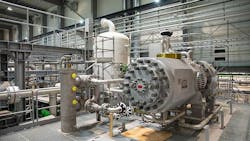Industrial Heat Pumps and the Future of Sustainability
The Industrial sector constantly seeks innovative solutions to enhance efficiency. As per statistics by US Energy Information Administration the industrial sector accounted for 33% of total energy consumption in the United States in 2022 and 35% of end-use energy consumption. Furthermore, it is estimated that waste heat from hot equipment surfaces, heated products, cooling water, and hot exhaust gases accounts for 20–50% of industrial energy input.
So, let's face it: the industrial world has long been plagued by a nagging problem-energy waste. So much heat generated by industrial processes just ends up, quite literally, vanishing into thin air. That’s where industrial heat pumps step in and shake things up. These marvels are turning the tables by capturing wasted heat and putting it back into the system. It’s a win-win: businesses save big on energy costs, and the environment breathes a little easier. Simply put, industrial heat pumps are not just solving problems, they’re rewriting the energy efficiency rules.
Why Industries Are All-In
Industrial heat pumps are highly versatile, finding applications across diverse industries. Key areas of deployment include:
Chemical and Petrochemical: They recover and utilize process heat for distillation, drying, and chemical reactions, significantly improving energy efficiency.
Food and Beverage: These systems are employed in pasteurization, sterilization, drying, and refrigeration, enabling sustainable food production processes.
Pulp and Paper: Heat pumps contribute to drying paper and optimizing steam generation, enhancing production efficiency.
Pharmaceuticals: From maintaining precise temperatures to recycling process heat, they ensure cost-effective operations.
Textiles: They assist in dyeing, washing, and drying process, reducing the energy footprint of textile production.
Tangible Benefits
What sets industrial heat pumps apart is their ability to deliver measurable benefits
Energy Efficiency: Recycles waste heat, reducing the need for external energy sources and lowering energy consumption. Compared to conventional heaters, industrial heat pumps may effectively provide three to five times as much heat per unit of electricity by using electricity and low-temperature sources like sewage and seawater.
Cost Savings: Significantly cuts down on energy costs approximately by 70% by reusing heat within industrial processes.
Reduced Carbon Footprint: Captures and reuses energy, minimizing dependence on fossil fuels and cutting carbon emissions. Furthermore, by 2030, heat pumps can reduce CO2 emissions worldwide by at least 500 million tons per year, according to the International Energy Agency (IEA).
Operational Flexibility: Handles a wide temperature range, making it adaptable to various industrial applications.
Scalability: Can be customized to suit operations of any size, from small-scale facilities to large industries.
Global Demand
The demand for industrial heat pumps is surging globally, but regional dynamics play a big role in shaping the market. Europe, with its stringent environmental regulations, sees robust adoption in nations like Germany, France, and Sweden, focusing on sustainability. The German Federal Ministry for Economic Affairs and Climate Action has approved funds for BASF to build the highest capacity industrial heat pump in the world. Additionally, according to International Energy Agency, heat pumps sales reached 3 million in 2022.
In Asia Pacific leads with rapid industrialization and strong governmental incentives in countries like China, Japan, and India. Mitsubishi Electric unveiled the Climaveneta EW-HT-G05 water-to-water heat pumps in September 2024. These pumps are intended for use in commercial and industrial settings. These cutting-edge heat pumps provide an effective solution for large-scale heating and cooling requirements with capacities ranging from 73 kW to 129.3 kW and a coefficient of performance (COP) of up to 3.77. With its most recent introduction, Mitsubishi Electric hopes to broaden its product line in the HVAC industry by offering high-performance and environmentally friendly heating solutions designed for challenging settings.
In North America, rising energy costs and decarbonization initiatives are boosting demand, particularly in the US and Canada. Americans have bought more than 4.3 million heat pump units in the year 2022. Meanwhile, emerging markets in South America and the Middle East are gradually embracing heat pump technology as industrial modernization progresses.
Growth Trajectory
The industrial heat pump market is on a fast growth trajectory, driven by advancements in technology and the rising need for energy-efficient systems. As per Research Nester analysts, the industrial heat pump market is projected to grow at a compound annual growth rate (CAGR) of 5.7% from 2024 to 2037, from an estimated USD 1.5 billion in 2024 to USD 2.9 billion by the end of 2037.
Manufacturers are now focusing on high-temperature heat pumps, capable of operating in demanding industrial settings. Collaborations between heat pump providers and energy service companies are also fostering innovations and accelerating adoption.
For instance, a water-to-water industrial heat pump based on ammonia (R717) has been introduced by US manufacturer Copeland under the Vilter brand. It has a heating capacity of 1 to 5MW (284 to 1,422TR) per skid and is intended for decarbonizing district heating and industrial process heating applications, such as the production of food and beverages. As more industries recognize the economic and environmental benefits, the market is expected to see a robust expansion in the coming years.
It is clear that industrial heat pumps are rewriting the rules of industrial energy management. By turning waste heat into a valuable resource, they address critical pain points, from high operational costs to environmental compliance. Whether it’s the food, chemical, or textile industry, the applications are vast, and the benefits undeniable. As businesses face increasing pressure to operate sustainably, industrial heat pumps offer a proven path forward.
Source: https://www.researchnester.com/reports/industrial-heat-pump-market/6686
